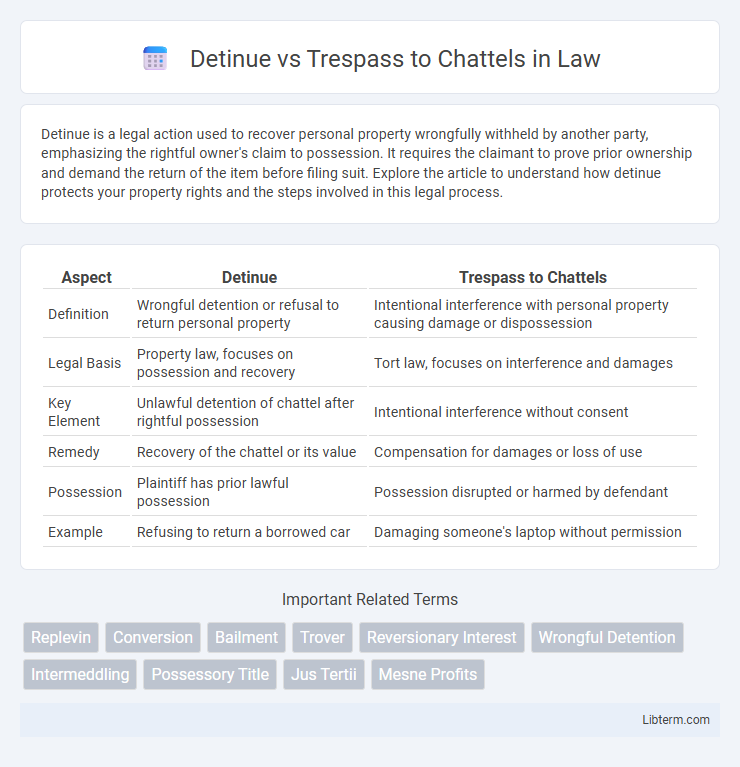Detinue is a legal action used to recover personal property wrongfully withheld by another party, emphasizing the rightful owner's claim to possession. It requires the claimant to prove prior ownership and demand the return of the item before filing suit. Explore the article to understand how detinue protects your property rights and the steps involved in this legal process.
Table of Comparison
| Aspect | Detinue | Trespass to Chattels |
|---|---|---|
| Definition | Wrongful detention or refusal to return personal property | Intentional interference with personal property causing damage or dispossession |
| Legal Basis | Property law, focuses on possession and recovery | Tort law, focuses on interference and damages |
| Key Element | Unlawful detention of chattel after rightful possession | Intentional interference without consent |
| Remedy | Recovery of the chattel or its value | Compensation for damages or loss of use |
| Possession | Plaintiff has prior lawful possession | Possession disrupted or harmed by defendant |
| Example | Refusing to return a borrowed car | Damaging someone's laptop without permission |
Introduction to Detinue and Trespass to Chattels
Detinue and trespass to chattels are distinct torts addressing interference with personal property. Detinue involves the wrongful detention or refusal to return goods lawfully possessed, while trespass to chattels concerns intentional interference or damage to another's movable property without consent. Both protect possessory rights but differ in the nature of interference and remedies available.
Definition of Detinue
Detinue is a common law tort involving the wrongful detention of personal property, where the plaintiff demands the return of the chattel and the defendant fails to comply. Unlike trespass to chattels, which addresses interference with possession without necessarily requiring actual detention, detinue centers on an unlawful refusal to return property lawfully acquired or held. The primary remedy in detinue is typically the recovery of the specific item or its value, emphasizing the plaintiff's right to possession.
Definition of Trespass to Chattels
Trespass to chattels refers to the intentional interference with another person's personal property without consent, causing harm or deprivation of use. It involves unauthorized use or damage to movable possessions, differing from detinue, which focuses on the wrongful detention and refusal to return goods. Legal remedies for trespass to chattels typically include compensation for actual damages rather than the recovery of the chattel itself.
Key Differences Between Detinue and Trespass to Chattels
Detinue involves the wrongful detention of personal property after lawful possession has been established, while trespass to chattels concerns the initial wrongful interference or dispossession of personal property without consent. In detinue, the plaintiff demands the return of the specific item, seeking its recovery or damages for its detention, whereas trespass to chattels typically results in damages for harm caused to the property or for loss of use. The key difference lies in detinue addressing wrongful retention after possession, contrasted with trespass to chattels focusing on unauthorized interference or dispossession.
Essential Elements of Detinue
Detinue requires the plaintiff to prove lawful possession of the chattel, the defendant's wrongful detention or refusal to return the property, and a demand for its return. Trespass to chattels involves intentional interference with possession causing dispossession, damage, or deprivation of use, without necessarily requiring a demand. The essential elements of detinue emphasize the continuing wrongful detention of goods wrongfully withheld after the rightful possessor's request.
Essential Elements of Trespass to Chattels
Trespass to chattels requires intent to interfere with another person's possession of personal property, actual interference with the property, and resulting harm or deprivation of use. The interference must be intentional but need not involve dispossession, differentiating it from detinue, where wrongful detention and refusal to return the property is central. Essential elements include unauthorized use or damage to the chattel that diminishes its value or deprives the owner of its use for a substantial time.
Legal Remedies for Detinue
Detinue permits the claimant to recover specific goods wrongfully detained by the defendant and seek damages for loss of use or value, while trespass to chattels typically involves claims for damages only. Legal remedies for detinue primarily include the right to immediate possession of the item or its return, often enforced through a court order for delivery. Monetary compensation may be awarded to cover diminished value or loss resulting from the defendant's refusal to return the chattel.
Legal Remedies for Trespass to Chattels
Legal remedies for trespass to chattels primarily include compensatory damages to redress the plaintiff's loss due to interference with their personal property. Courts may also award replevin, allowing the rightful owner to recover possession of the chattel. In some cases, injunctive relief can be granted to prevent ongoing or future unauthorized use or interference with the property.
Real-World Examples and Case Law
Detinue involves wrongful detention of goods, exemplified in *The Moorcock* (1889), where the defendant's failure to return cargo led to a successful claim for detinue. Trespass to chattels, seen in *CompuServe Inc v. Cyber Promotions, Inc.* (1997), addresses unauthorized interferences, such as sending unsolicited bulk emails causing harm to the plaintiff's computer systems. While detinue requires possession and refusal to return goods, trespass to chattels focuses on interference without consent, often involving temporary dispossession or damage.
Conclusion: Choosing the Correct Legal Action
Selecting between detinue and trespass to chattels depends on the nature of the property dispute; detinue is appropriate when reclaiming possession of wrongfully detained goods, while trespass to chattels addresses unauthorized interference causing harm or dispossession. Courts typically require proof of wrongful detention for detinue claims and actual damage or dispossession for trespass to chattels cases. Understanding the specific elements and remedies of each tort ensures the correct legal action, maximizing the likelihood of recovery or damages.
Detinue Infographic

 libterm.com
libterm.com